The fall film festivals are known for their celebrity and glamor. Our biggest stars kickoff awards season to celebrate the most marketable films — good and bad.
But this year was different. Due to the ongoing actors and writers strikes in the US — specifically the AMPTP’s refusal to negotiate and give fair compensation to the artists who create their billions — the only thing worth celebrating was the cinema itself.
The Toronto International Film Festival was uniquely qualified to meet this moment. TIFF may be talked about as an Oscar predictor, but the reality is they screen over 200 feature films. The star-studded English-language movies are a small fraction of what the festival has to offer every year. Most of my favorite films from last year weren’t even released in 2022, let alone part of awards conversations.
This year, I saw 38 features and, once again, most of my favorites were independent or not in English. There’s a vast world of cinema beyond Hollywood’s broken system! We can look toward that art as we try to change our circumstances. A handful of billionaires do not get to decide the future of this art form.
I wrote a little about every film I watched at the festival. Most of these films are queer, but certainly not all of them. My perspective is queer, and I think it’s important a queer perspective is brought toward all art — not just the work made by us or about us.
After the Fire (dir. Mehdi Fikri)
French theatrical release on November 8th. US release unknown.
In recent years, I’ve become less demanding of subtlety from political cinema. Nothing about our world is subtle, and subtlety is not a requirement for artfulness. Mehdi Fikri’s debut feature is not subtle — it is artful. Following Malika and her family on their quest for justice after her brother is murdered by the police, the film portrays the ripples of violence caused by law enforcement. Not only are Malika and her family in mourning, they are also forced to choose between accepting a false narrative about their brother’s death or dedicating their lives to fighting an unjust justice system. Fikri’s camera floats around the family, capturing the dreamy haze of grief. There is a constant feeling of instability due to the death, due to the impossible choices faced by these characters. Camélia Jordana is remarkable as Malika. She and the entire supporting cast create a family that feels real in moments of sorrow and in moments of joy.
While the film hints at the plot structure of a legal drama, ultimately it makes the stronger choice of focusing on character. These people are not granted the plotting of easy justice — only a brutal system, an endless toll.
Anatomy of a Fall (dir. Justine Triet)
Limited theatrical release on October 13th. Streaming to follow.
Backspot (dir. D.W. Waterson)
Release date unknown.
I know D.W. and Devery so, unfortunately, I can’t review this, but what I will say is I think you, the readers of Autostraddle, are going to LOVE it. Not only is it the ultimate queerleader movie — all the actors are doing their own wildly impressive cheer — but it strikes a balance rarely seen in queer media. Usually gay films are split between the wholesome and the dark. This is a film that lets in the darkness of life — and of being a teenage girl with anxiety — while allowing its queer relationship to remain wholesome. People with anxiety and people with complicated family relationships can also be cute and can also triumph! The film still has conflict. It just understands that for a teenage girl smaller conflicts can feel like the entire world is about to explode. When this film gets released, I promise resident queerleader expert Kayla will be here to review it. Hopefully that happens soon!

Devery Jacobs in Backspot
Banel & Adama (dir. Ramata-Toulaye Sy)
Currently in theatres in France. US release unknown.
The main character of Ramata-Toulaye Sy‘s debut repeats the title of the film like a prayer. It’s her name, Banel, and her husband’s name, Adama, and their union is her life’s priority. A woman in her Senegalese village is supposed to be loyal to her husband, but not like Banel. It’s about childbearing and duty — not love. Banel’s devotion is viewed as dangerous and — when Adama refuses his lineage as chief — the cause of an unrelenting drought. While the plot may be repetitive and the magical realism underdeveloped, the film finds its real magic in Sy’s filmmaking and lead actress Khady Mane’s performance. The film contains several shots of the harsh environment and Mane’s face that will stick within me for a long time to come. Despite the repetition of the two names in the title, this is Banel’s film. It’s less a love story between two people and more a love story between one person and her love.
The Boy and the Heron (dir. Hayao Miyazaki)
Currently in theatres in Japan. US release unknown.
Legendary anime director Hayao Miyazaki has spent decades retiring. Since Princess Mononoke in 1997, every film has been stated or rumored to be his last. It’s not uncommon for an artist to faux-retire, but something about the ephemerality of each film maybe being the last feels especially fitting for Miyazaki.
Originally titled How Do You Live? before changing to the less fitting The Boy and the Heron, Miyazaki’s latest is about grief and acceptance. It’s about living another unpromised day and finding beauty in the temporary. Mahito, the titular boy, is whisked away from Tokyo by his father during World War II to live with his aunt/new stepmom. He is still grieving the recent death of his mother and isn’t ready to accept this new life. After encountering a unique heron and a magical tower, Mahito sets off on a journey through time and space — a mix of heartfelt metaphors and imaginative delights.
At times, this all feels like several films smashed into one. This is not the perfection of Princess Mononoke or The Wind Rises but rather the tangled ambition of a film like Howl’s Moving Castle. As far as I’m concerned, Miyazaki only makes great films, so if this ends up not being among my very favorites, I’ll still hungrily enjoy its existence.
Everyone dies, every filmmaker someday makes their last film, but I’m grateful Miyazaki hasn’t retired. He is an artist unlike any other. Each new film is a gift of existence.
Chuck Chuck Baby (dir. Janis Hugh)
Release date unknown.
There’s a reason karaoke scenes are a staple of sapphic cinema. Nothing quite says, “I’m a dyke!” like belting your heart out amongst friends, with your lover, or all alone with longing. Janis Pugh’s debut feature Chuck Chuck Baby makes a whole movie out of these scenes. Helen is a closeted queer woman stuck in a dead end life with a shitty husband and a job she hates. A glimpse of hope arrives with the return of her childhood crush, Joanne. Sometimes grounded in reality, sometimes heightened, Helen, Joanne, and their shared group of supportive friends are constantly expressing themselves by singing along to their favorite songs. These sequences are lovely — capturing something between Jacques Demy and John Carney.
The film is less successful when the singing stops. Louise Brealey as Helen and Annabel Scholey as Joanne have a nice chemistry together, but the dramatic turns feel simple and contrived and the characters are never quite granted a life beyond their archetypes. Nevertheless, this is still a sweet film that’s well-directed and will appeal to anyone who likes their lesbian cinema just the right amount of saccharine.
Close to You (dir. Dominic Savage)
Release date unknown.
Almost two years ago, I watched every single Elliot Page movie to experience and re-experience them through the lens of his transness. This project confirmed what I already knew: Page is a very special actor. While the premise of a trans person returning home to their family is a bit cliché, I went into Page’s post-transition return to cinema with high expectations. What a treat to finally see this actor perform without the veil of the closet shrouding his talents. Unfortunately, all Close to You reveals is that even the best actors need a script.
British writer/director Dominic Savage is known for his improvisational approach to filmmaking. He gives the actors characters and prompts and then allows them the freedom to explore. No approach to art making is inherently wrong, but this lack of structure — at least without the necessary guidance — just pushes actors toward exposition and heightened emotion. Every scene in this film is either telling us explicit information about the characters and story or involves crying or screaming. There’s no texture, there’s no nuance. In an attempt to capture ultimate reality, every moment feels false.
The scenes between Page and Hillary Baack, who plays an old friend/ex-lover, are better than the scenes between Page and his character’s family. Baack gives the strongest performance in the film, and this also feels like a product of Savage’s limited point-of-view. He understands the love story — love being universal after all — far more than he understands a trans person visiting their family after time away. Every trans person has a different family and a different relationship to their family, but the dynamics among this family somehow manage to feel both predictable and unrealistic. You can feel the actors treading water, filling space, and moving from guidepost to guidepost. Savage’s camera captures all this tired drama with an ugly handheld aesthetic.
Whenever independent filmmakers tout the value of improvisation, I think about film icon John Cassavetes. His low-budget films are known for their realistic performances and raw-feeling cinematography. People often think this cinéma vérité vibe was achieved by embracing chaos. But the truth is that Cassavetes’ scripts were tight and his camerawork precise. It took a lot of planning to create work that felt so spontaneous.
This is just the first film in what will hopefully be a long new phase of Page’s career. I hope he gets the scripts he deserves. I hope some of them are even written by trans people.
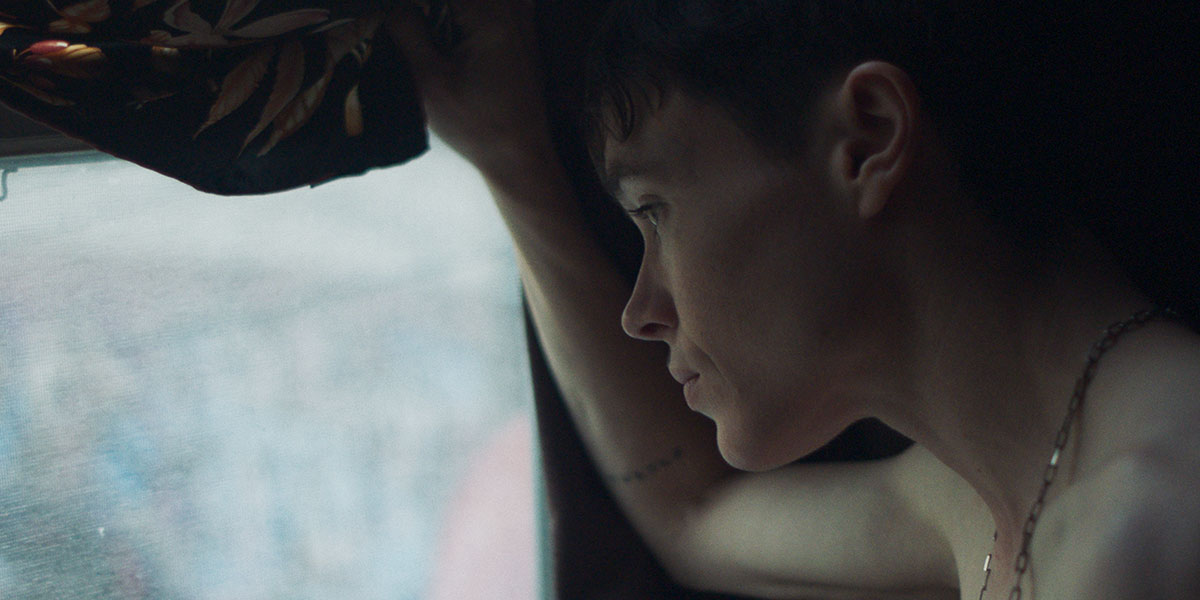
Elliot Page in Close to You
Copa 71 (dir. James Erskine, Rachel Ramsay)
Release date unknown.
Executive produced by Venus and Serena Williams, this documentary reveals a lost chapter in women’s sports. While the first official Women’s World Cup occurred in 1991, there was another global soccer event two decades earlier deserving of rediscovery. The breath of archival footage and interviews with former players are delightful even if the film isn’t quite as interesting as the story it tells. The documentary only occasionally captures the excitement of watching a great sporting event instead focusing on a narrative tracking women’s soccer from historically banned to increasingly popular. This perspective isn’t inherently wrong, but it’s unsatisfying since the film focuses exclusively on this one sport and on cis women. If this was the angle the film wanted to prioritize, I would have been interested to see comparisons made to the exclusion of women from other sports — such as baseball — and an engagement with current bans against trans athletes.
There’s also only a surface level approach to the interviews leaving out the majority of interpersonal details. I’m sure there were a lot of stories to tell about each team in this competition and their interactions with one another. (There was a fist fight on the field during one game for God’s sake!) This documentary is worth watching for fans of women’s soccer/football and I’m glad this story is finally being told. I just wish the telling went a lot deeper.
Days of Happiness (dir. Chloé Robichaud)
Canadian theatrical release on October 20th. US release unknown.

Dicks: The Musical (dir. Larry Charles)
Limited theatrical release on October 6th. Streaming to follow.
The worst pairing of director and material since Spielberg directed West Side Story, Larry Charles’ Dicks: The Musical feels as flat as a filmed bootleg of a play. But, hey, at least it’s a good play!
Based on the their Off-Broadway musical Fucking Identical Twins, writers and stars Josh Sharp and Aaron Jackson have created an irreverent response to cis white gay male respectability. What begins as a satire of over-the-top masculinity — Sharp and Jackson’s characters are straight — gets gayer and weirder and funnier until it crosses its inevitable line. Charles knows how to direct comedy and knows how to cast. Nathan Lane, Megan Mullally, Bowen Yang, and MEGAN THEE STALLION each bring so much to their roles, fitting in perfectly with and then expanding Sharp and Jackson’s universe.
But what prevents this from really working as a movie is its lack of queer form. There’s so much queer energy in the writing and performance — I wish there was some in the style. Instead the scenes and musical numbers follow one after the next, growing tedious with their lack of visual energy. I understand the source material was contained, but so were the stage shows for Hedwig and the Angry Inch and La llamada. Both of those adaptations managed to capture their contained stories on-screen in ways that felt dynamic.
Even if it’s not the best movie, it’s still worth watching for the material and the performances. Thirty years since Zero Patience, we need more movie musicals that are super fucking gay.
Evil Does Not Exist (dir. Ryūsuke Hamaguchi)
Release date unknown.
Ryūsuke Hamaguchi is known for his long films including the Oscar-nominated Drive My Car. That’s why his latest — clocking in at 106 minutes — makes more sense when you know it started as a short. Originally it was supposed to exist without dialogue, created to accompany Eiko Ishibashi’s gorgeous score. But it’s as if Hamaguchi, in capturing the transcendental beauty of the town of Harasawa, couldn’t block out thoughts of its destruction. Our natural wonders are disappearing, human beings having spent centuries taking more than our share.
The title of the film feels like a challenge. If evil does not exist then how do we explain the imbalance of humanity? What happens if we actually engage with mundane greed and myopia? Can we stop it? Or can we only seek revenge?
Despite its moderate length, this film still feels like an ambitious step forward for Hamaguchi. All his work mixes poetry and realism and this somehow increases both. Rather than crumbling under the pressure of international success, Hamaguchi seems to have committed even deeper to his strongest impulses. We are so lucky to share our planet-in-crisis with this singular artist.

Ryo Nishikawa in Evil Does Not Exist
His Three Daughters (dir. Azazel Jacobs)
Release date unknown.
It almost works that all three actresses in Azazel Jacobs’ tale of sisterhood and grief feel like they’re in different movies. After all, it’s said more than once that the three sisters have little in common. This is a film that bluntly says a lot about its characters and themes — whether that makes it overwritten or stylized is a matter of debate.
Carrie Coon as the uptight eldest leans into the writing by allowing her usual excellence to give way to a stilted cadence. Elizabeth Olsen as the earth mom youngest leans in by finding humor in her character’s over the top emotional speak. But it’s Natasha Lyonne who is the true standout, balancing the writing with a raw emotional naturalism.
As the film settles into its dynamics and gets its exposition out of the way, it begins to feel less like a movie that needed another draft and more like a workshop of a lovely play. Its three sisters may each occupy an archetype, but the dynamic between them feels relatable and true. Death is a part of life that allows for a bit of the overwrought and the closer death comes in the film, the more Jacobs’ writing works. Still, I wish a film with this strong of a cast trusted its actors’ faces a bit more. On stage, more needs to be said. On screen, you can trust the power of a close up.
Hit Man (dir. Richard Linklater)
Release date unknown.
Richard Linklater’s latest is based on the true story of Gary Johnson, a philosophy professor who worked with the police as an undercover fake hit man leading to the convictions of more than 70 people. Linklater and co-writer/star Glenn Powell have taken that story and inserted a splash of noirish intrigue. Unfortunately, their reverence for the real man and their grotesque liberalism ruin the endeavor. This story needed a dark edge — instead it got sweet comedy.
The 2020 protests against police violence promised a reckoning for Hollywood’s portrayal of law enforcement. Instead it simply took away the bite of these works and led to even more insidious copaganda. Linklater and Powell give lip service to police brutality by creating one bad cop. He is the one white cop character. All the “good” cops are people of color. It’s not just that this spreads a harmful and false message that the issues with policing will be solved by more cops of color — it also results in one-note characters and bad writing. A movie supposedly about moral complexity divides its law enforcement characters into entirely good or entirely bad. The people Johnson helps arrest are similarly split. They are all shown to be stereotypical villains — except the ones who aren’t and avoid conviction. It’s a fantasy of our justice system that weakens the film politically and artistically.
Its desire for ethical ease isn’t the only way it fails its noir roots. Linklater and Powell’s portrayal of Johnson allows him several developed characters — they don’t offer the same for his love interest, Madison, played by Adria Arjona. She is a flat character, insulting to women and to film history’s rich tapestry of femme fatales. She exists only as a vessel for projected fantasies while a good femme fatale should create the fantasy — for their prey and for the audience.
Linklater, Powell, and even Arjona, are clearly having fun and that fun is occasionally contagious. But this movie needed the nasty spirit of Linklater’s Bernie to explore its intended themes. Instead every interesting aspect of the true story and the imagined story are smoothed out. This is what’s lost when movies have such a toxic liberal politic — not only are they worse for our world, they’re worse as a work of art.
How to Have Sex (dir. Molly Manning Walker)
Release date unknown.

Humanist Vampire Seeking Consenting Suicidal People (dir. Ariane Louis-Seize)
Release date unknown.
Since literary classic Carmilla was published in 1872 and even more famous literary classic Dracula was published in 1898, stories about vampires have pervaded pop culture. On-screen there have been countless takes on those texts and these creatures — funny, serious, cool, brutal, gay, straight, even sparkly. Ariane Louis-Seize’s debut feature aims to reinvent the subgenre once again with its tale of a young vampire who is too concerned with the well-being of humans to feed. Sasha, the vampire, meets a depressed human boy named Paul and thinks his suicidal ideation might be the answer to her problems. What follows is a tale of friendship that falls somewhere between A Girl Walks Home Alone at Night, Let the Right One In, and Twilight.
While the film is intriguing in its metaphors of mental illness and familial isolation, it frustrates in its inability to solidify its premise. Any interesting ethical questions are hollowed by the film never addressing why Sasha takes no moral issue with drinking the blood of victims that her parents catch or why she isn’t more concerned about turning people since this will cause more harm in the long run. It also falters when it ascribes Paul’s depression to the obvious cliché of bullying rather than something more clinical (or existential) that might be interesting in the context of immortality and suicide. It’s well-made and somewhat entertaining, but this twee vampire tale fails in its attempts at originality. In the end, it feels less like a reinvention of the genre and more like What Amèlie Does in the Shadows.
I Am Sirat (dir. Deepa Mehta, Sirat Taneja)
Release date unknown.
Co-directed by accomplished director Deepa Mehta and its subject, Sirat Taneja, this documentary aims to tell a trans story from a personal perspective. When the film begins, Taneja is living a double life — at home with her mother she presents as a man but at work, in her social life, and online she’s her true self. Whether a planned choice or an accident born from Taneja’s experience posting online, when the image is vertical it’s Taneja’s own footage and when it’s horizontal it’s Mehta’s. This creates a clear distinction of gaze that works really well for the story.
The film feels truthful to Taneja’s experience and where she’s at in her journey even if its focus on her dual existence and early transition is somewhat standard for a trans documentary for cis viewers. As a white trans woman living in the US, the most interesting aspect of the film for me was how it presented Taneja’s experience with the Hijra community. It’s easy to romanticize that group from afar and I appreciated the way the film showed both how helpful they were for Taneja and how they ostracized her for not abandoning her mother. Even if the film’s presentation of transness is simple, its questions of responsibility and ethics are allowed to be complex.
Irena’s Vow (dir. Louise Archambault)
Release date unknown.
The more serious the story, the harsher I will be on a film. If you’re going to subject an audience to the brutal horrors of the Holocaust — horrors we’ve seen many times on screen in narrative films and docs — it better be worth it. There must be some perspective, some reason for the story, and it better be told well. Despite a strong central performance from Yellowjackets’ Sophie Nélisse, Irena’s Vow has neither purpose nor craft. It has a blunt script that uses the horrors it portrays to create thrills and manipulated emotions. It may reveal an undertold story from the period, but its approach to character and plot is so contrived it ends up feeling only like a commercial for the book from which it’s based. And, just when it appears to be merely tedious, it reaches new lows by inserting an anti-abortion subplot.
I’m glad I now know about Irena Gut Opdyke — I just wish I’d read her Wikipedia page instead of sitting through this film.
Last Summer (dir. Catherine Breillat)
Currently in theatres in France. US release unknown.
To call the cinema of Catherine Breillat provocative is to diminish what it achieves. Unlike other directors from the so-called French Extremity movement, Breillat shocks only with purpose. Few filmmakers have her understanding of the complexities of human behavior; few filmmakers have her formal control.
Her first film in ten years, Last Summer, is about a lawyer known for defending survivors of sexual abuse who herself becomes a perpetrator. When her teenage stepson arrives for the summer, their inappropriate flirting escalates to a full-on affair. This premise might feel pointedly controversial, but Breillat approaches it with an eye toward realism. This results in a film that reveals the scars of abuse, the complicity of family structures in sexual violence, and a portrait of someone becoming their own worst villain. Breillat’s sharp writing and even sharper camera make for a cinematic challenge, a cinematic gem.
Lee (dir. Ellen Kuras)
Release date unknown.
Ellen Kuras was one of the only women cinematographers to find mainstream success during the 20th century. Starting with New Queer Cinema classics Swoon and I Shot Andy Warhol, she then went on to have several notable collaborations with Spike Lee and Martin Scorsese. Kuras has now directed her feature debut with the fitting subject of war correspondent Lee Miller, another woman with a camera. Who did Kuras choose as her own DP? Not a woman, but Pawel Edelman, best known for his collaborations with Roman Polanski. I bring this up not as a political gotcha but to highlight the main issue with her Kate Winslet-starring biopic: it completely lacks in perspective.
Falling into just about every biopic trapping, Lee somehow manages to underline its message while saying nothing. The script is overwrought, overwritten, and maddening in its many monologues and penchant for sentimentality. This is the most frustrating kind of mediocrity — one that paints over the potential for greatness. Winslet is stellar and the supporting cast — including Andy Samberg — keep up with her. The quiet moments of Lee just looking are powerful… if only they weren’t interrupted by contrived dialogue. A lot is made of Lee’s presence where women are not allowed. But the most interesting thing about Lee isn’t that she was a woman, it’s that she saw women, that she saw so much that other people, other photographers, failed to see.
Remove the unnecessary framing device, trust the talented actors to communicate things left unsaid, pull back the sentiment from horrors that need none, and a fascinating and powerful film would remain. Alas, there is nothing more Hollywood than refusing to trust an audience’s intelligence. Well, except maybe hiring a DP who has enabled a rapist to shoot a movie about survivors of sexual assault.

Kate Winslet in Lee
Mother Couch (dir. Niclas Larsson)
Release date unknown.
I love surrealism. I love when movies use cinema to express how life feels rather than just showing how life is. But, in narrative films, surrealism is a tool that services character, story, and themes, and if those elements are bland then the surrealism can only do so much.
Mother, Couch starts off like a quirky dramedy. David, an always wonderful Ewan McGregor, is going furniture shopping with his mother, legend Ellen Burstyn, at what looks like an indie IKEA. Things take a turn when she sits on a couch and refuses to get up. David is increasingly exasperated as he tries to get his mom to leave with only mild help from his siblings played by Rhys Ifans and Lara Flynn Boyle, and his wife played by Lake Bell. The longer his mom stays in the store, the more the surrealism grows, until reality gives way to an allegory about forgiveness and parenthood.
Nothing about the movie feels particularly groundbreaking — it’s kind of like if Charlie Kauffman did a mediocre live-action adaptation of BoJack Horseman’s penultimate episode. But the performances are strong enough that they’d make the movie worthwhile if it weren’t for one insufferable subplot. Taylor Russell plays the daughter of the store’s owner and exists just to flirt with and provide temptation for the brothers. The movie is about a terrible mother — which is obviously fine — but the other women characters are the bitchy sister, nagging wife, and sex object store owner’s daughter. This results in a movie that feels less like it’s about forgiving one hateful woman and more like it just hates women. It’s boring to call out misogyny. I feel myself bored with this critique. But, trust me, it’s even more boring to watch.
National Anthem (dir. Luke Gilford)
Release date unknown.
Not a Word (dir. Hanna Slak)
Release date unknown.
Cinematographer Claire Mathon’s work on Stranger By the Lake, Atlantics, Portrait of a Lady On Fire, and Saint Omer has made any future film worth seeking out. Even if the film itself disappoints, the images certainly will not. Hanna Slak’s fourth feature is worthy of Mathon’s images. While its conductor protagonist is sure to elicit comparisons to TÀR, the film is more like a tender version of We Need to Talk About Kevin.
Maren Eggert plays a woman who is so consumed with her job she’s started to neglect her disturbed son. After he possibly attempts suicide, she decides to whisk him away to their island home in a misguided attempt to reconnect. It’s a mysterious film always on the verge of violent outbursts while never falling into any easy trappings of melodrama. Instead Slak trusts the images, the score from Amélie Legrand, and Eggert’s strong central performance to tell a story about balance and healing. Nature and human nature both contain the possibility for violence; they also contain a deep capacity for beauty. This film reveals both and then chooses to embrace the beauty.
NYAD (dir. Elizabeth Chai Vasarhelyi, Jimmy Chin)
Limited theatrical release on October 20th. Netflix release on November 3rd.
Orlando, My Political Biography (dir. Paul B. Preciado)
Limited theatrical release on November 10th. Streaming to follow.
The Queen of My Dreams (dir. Fawzia Mirza)
Release date unknown.
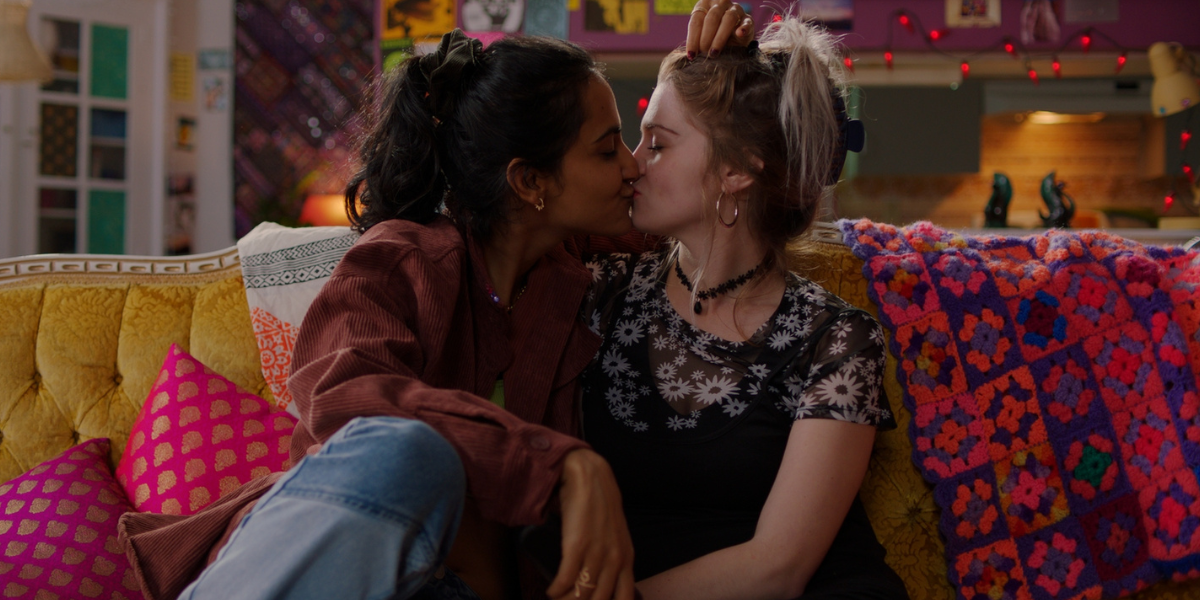
A Road to a Village (dir. Nabin Subba)
Release date unknown.
Recalling Italian neorealism and the early work of Abbas Kiarostami, this Nepalese film follows a father and son as they adjust to a forced modernity. Maila is a basket weaver whose skill and craftsmanship has lost value upon the arrival of cheaper goods from the city. His lack of purpose and resources begins to have an effect on his seven year old son, Bindray, who is already learning the necessity of status. Both Maila and Bindray are trying to figure out what kind of men they can be in a contemporary world and these dual journeys begin to pull them apart. The film is at its best when focusing on their relationship and the parallel abuse they face. I wish Maila’s wife and Bindray’s mother was granted the dimensionality of the two male characters. Her role is often relegated to just another cruel obstacle her husband and son face. Nevertheless, this is still a powerful — and very bleak — look into a place and culture rarely shown on-screen.
Rustin (dir. George C. Wolfe)
Limited theatrical release on November 3rd. Netflix release on November 17th.
Guided by legendary theatre director George C. Wolfe, Colman Domingo gives a remarkable performance as civil rights leader Bayard Rustin. It’s not just the pathos he brings to the big emotional beats; it’s how fun he is to watch in every single moment. This is especially impressive because the script he’s working with is somewhere between bad and mediocre on the scale of standard biopics.
Produced by the Obamas’ Higher Ground Productions, the film presents Rustin’s story in the most palatable way possible, removing the parts that would be the most authentic and the most interesting. I’m glad this story is being told both to teach more people about Rustin and due to its focus on the work of organizing. But this sort of biopic polish makes it feel like distant history rather than having a needed urgency. It’s difficult not to compare this to Selma, a far better movie with an overlapping story. That film was an effective snapshot of recent history because it used all the tools of cinema. I wish Wolfe was allowed a few more from the box — and outside of the box.
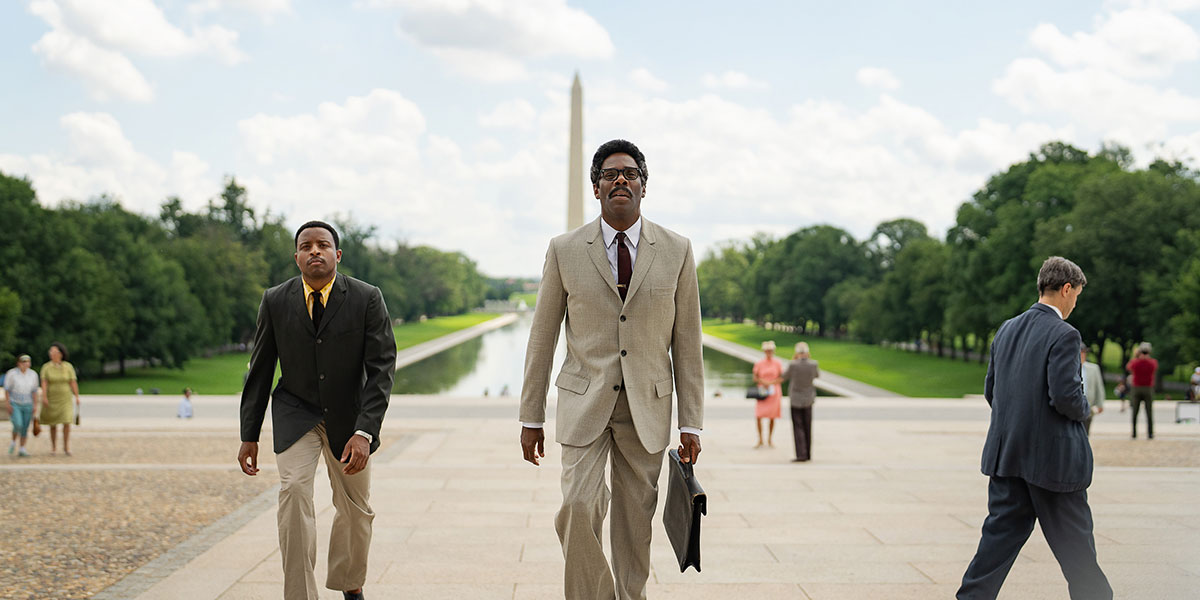
Colman Domingo in Rustin
Solo (dir. Sophie Dupuis)
Currently in theatres in Canada. US release to follow.
As a movie about a person whose absent mother leads him into an emotionally abusive relationship, Solo is stellar. It’s painful and challenging and real. As a movie about drag, it’s disappointing.
Any movie about an artist or an athlete has the challenge of replicating that skill. But with an art like drag that has become so mainstream over the past decade, it’s difficult to watch something set in that world where none of the applauded queens or acts feel worthy of that applause. Théodore Pellerin is incredible in the lead performance — his gradual deterioration is nuanced and electric. I understand Dupuis wanting to cast an actor with his experience and skill. I just think the movie would’ve worked better if the other performers surrounding Pellerin had the experience and skill of drag artists. This film is still worth watching for its characters and all the scenes that take place outside of the drag club. I just wish actual drag artists weren’t relegated to mediocre straight to streaming comedies while non-drag artists are trusted with this far more interesting work.
Sorry/Not Sorry (dir. Caroline Suh, Cara Mones)
Release date unknown.
There are a lot of reasons to make a documentary about Louis CK. Not only was he one of the most famous men to face accusations at the height of the mainstream Me Too Movement, he was also one of the only people to admit to his behavior and one of the quickest to make a comeback. But how much did he really admit? And how quickly did he walk that admission back to regain his success? What is our culture’s relationship with forgiveness? Who do we forgive? There are many questions to ask, many details to uncover. Instead this documentary seems to exist only to celebrate its producers, the New York Times, and talk to an audience that already knows the story who can shake their heads in self-righteous disappointment.
The best part of the documentary is when it focuses on Jen Kirkman. She reveals the first-hand nuances of being a woman in comedy and does so with the engagement of a performer. Other talking heads are occasionally interesting, but the film so badly wants to make heroes out of certain people who just aren’t compelling enough in that role. The film never engages with larger questions of harm or forgiveness. It fails to place the Louis CK story in a larger context beyond CK and comedy. It also never questions what it means for someone to apologize only to the five women who went on the record — as if that means across decades only five women were harmed. I understand the journalistic challenges of speculation, but that’s why I wish the film had used this one situation as an excuse to speak more broadly about how our culture can reckon with abuse, especially from people who are famous. That felt like the goal — it just never manages to say anything new or challenging.
I would rather a bland documentary like this be at the festival than a new film from CK — which isn’t out of the question considering the festival platforming Alexander Payne this year. I just wish these weren’t the only options. We won’t solve these problems until we get better at talking about them. Sorry/Not Sorry does nothing to advance that conversation.
Spirit of Ecstasy (dir. Héléna Klotz)
Release date unknown.
On the TIFF website, this movie does not have the 2SLGBTQ+ tag. This feels like an oversight for a film centered on a nonbinary character — until you watch the film and realize the programmers were trying to spare anyone who actually lives that experience from watching. The question then becomes why it was programmed at all. While it’s formally pleasant, nothing about this story of a nonbinary person interested in finance feels special enough to forgive the ways it fails its main character and the experience it aims to portray.
Starring French singer Pomme — who is queer but who is at least not out as nonbinary — in a terrible wig, the film’s portrayal of a transmasculine person is comical and objectifying. The film conflates binding with bandaging a wound and show’s the character’s breasts within the film’s opening minutes. The character is forced to wear a goofy oversized suit the whole movie. When confronting their rapist, the character refers to their past self as a girl, which feels like it’s meant to imply they lost their girlhood because of the rape. This is further implied when the only time we see them not wearing a binder is during a sex scene with their rapist after he’s apologized and they’ve reconciled. (That this reconciliation leads to romance at all is its own major problem separate from concerns of gender.)
Between the hypermasculine world of investment banking and the reference to the military, it’s clear Klotz is most interested in masculinity. She could have explored these same themes with a story centered on a cis woman trying to fit into male culture rather than using transness as a poorly executed metaphor.
No more trans movies without trans voices — certainly not when this is the result.
Strange Way of Life (dir. Pedro Almodóvar)
Theatrical release on October 6th. Streaming to follow.
Pedro Almodóvar is probably my favorite filmmaker of all time. He’s certainly the one who inspires me the most as an artist. Getting to watch his new short in the middle of a long discussion of his body of work and then later that night GETTING TO MEET HIM at a party was easily the highlight of the festival for me. So, yes, I’m a fan, and I really liked this film.
Conceived as a response to Brokeback Mountain — a movie Almodóvar famously almost directed — it’s obvious to approach the film through its queer and sexual politic. But I actually think the most interesting thing about the movie is how it fits into Almodóvar’s career-long treatment of law enforcement. Growing up during the Franco regime and being a gay punk led Almodóvar to create work uniquely anti-law enforcement compared to other world-renowned auteurs. Usually, cop characters are portrayed as a combination of evil and stupid. But this film, like 1997’s Live Flesh, lets a cop be a main character. Almodóvar is playing with the western genre so it makes sense he’d choose a sheriff and an outlaw as his central lovers. While he could’ve allowed these archetypes to exist unexplored, instead he raises interesting questions about illegality, immorality, and loyalty. Who creates our moral codes? What does life look like when we create those for ourselves rather than leaving them to the state?
Yes, this movie has the signature Almodóvar color palette and impeccable costumes from Saint Laurent. Yes, this movie has a flashback where two men lick wine off each other’s faces. Yes, this movie has Ethan Hawke and Pedro Pascal as lovers and a lovely shot of Pascal’s butt. This is who Almodóvar is as a filmmaker. His work is filled with sumptuous treats all in service of stories that challenge. In his hands, the trickiest subjects go down smooth.
Also he’s super nice at a dinner party.
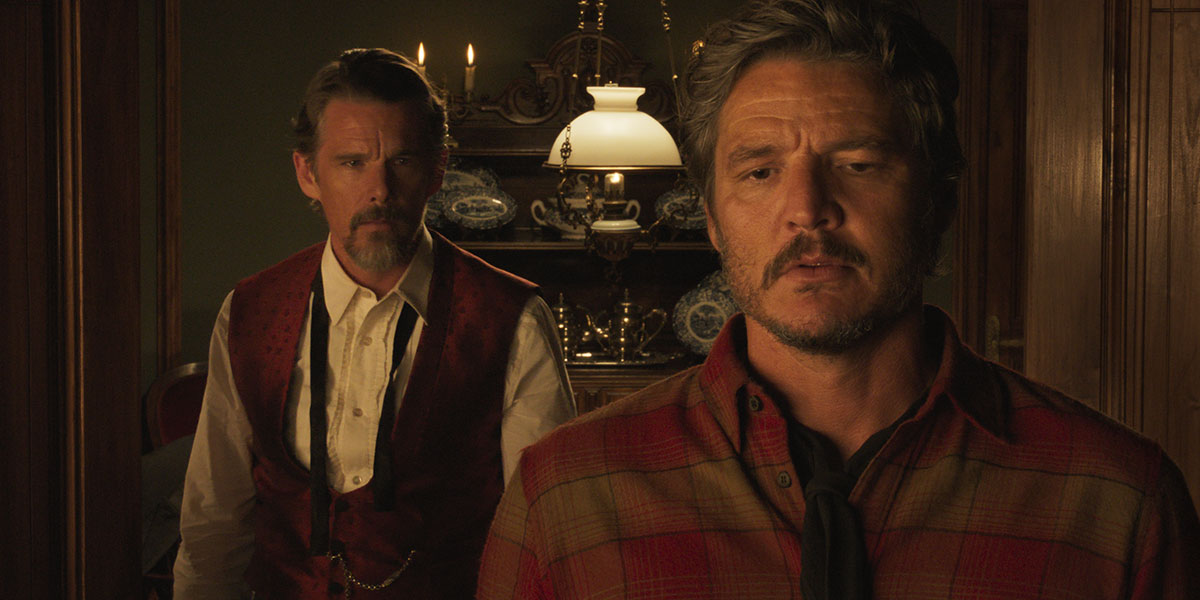
Ethan Hawke and Pedro Pascal in Strange Way of Life
Summer Qamp (dir. Jen Markowitz)
Release date unknown.
Documentaries about trans kids fall into two categories: those for cis people and those for trans people. Cis people get everything from the tender to the clinical to the unsympathetic. Trans people get, well, the only one I can think of is Always Amber which never got a major release. Summer Qamp falls somewhere in between.
Documenting the experiences of several kids at Camp fYrefly in Alberta, this documentary shows the importance of queer and trans youth receiving affirmation and community. At a time when trans youth is under cultural and legislative attack, it feels important to have a space like Camp fYrefly and a celebration of that space on-screen. The film may lean toward easy narratives, but it’s hard to argue with that approach given the current climate. I would have liked to see how the kids adjusted back to regular life after camp; I would have liked to see more of the conflicts that inevitably occurred at the camp itself. I still appreciated this positive snapshot of queer and trans youth. It may not be the most complicated documentary, but for these kids, and so many more, real life might be complicated enough.
Unicorns (dir. Sally El Hosaini, James Krishna Floyd)
Release date unknown.
Wicked Little Letters (dir. Thea Sharrock)
Release date unknown.
Comedy is subjective. And, based on the laughs in my TIFF audience, comedy is just Olivia Colman saying the word fuck. That’s about all this movie has to offer in terms of laughs, but, in terms of drama, there is much unpleasantness in its portrayal of abuse, misogyny, and oppression. I love when comedies tackle serious subjects, but I do hope they are actually funny. And if they lack in laughs, I hope their drama is effective — that characters feel developed and themes well-explored. This has none of it.
Any takes on misogyny are undermined by its decision to cast without considering race. Anjana Vasan is always great but can’t save her poorly written policewoman character. She is constantly talked down to due to her gender with no mention of her race. Like many white women filmmakers, Thea Sharrock wants to explore sexism while pretending race doesn’t exist. Or, even more sinister, wants to use Vasan’s race to get away with having a heroic cop character.
This wouldn’t be as much of a problem if the film was fun. But Olivia Colman and Jessie Buckley are just as wasted with this script and the muddled — at best — politics are all that’s left.
Wildcat (dir. Ethan Hawke)
Release date unknown.
The fall festivals are a time for the most by-the-numbers biopics to launch their Oscar hopes. Amid that sameness, this collaboration between Ethan Hawke and daughter Maya Hawke about the life and work of Flannery O’Connor is a much needed burst of inspiration. Rather than tell a traditional story, Hawke and co-writer Shelby Gaines combine more standard biopic fare with several adaptations of O’Connor’s work. When Maya Hawke as O’Connor writes, we see what she’s writing and we see Hawke as the various characters. Not only does this result in a more interesting film, but it creates a connection between O’Connor and her work. A writer known for her exploration of the grotesque, this version of O’Connor is a grotesquery of her own. Her characters are a part of her and a part of her mother played by Laura Linney who also lives in the various stories.
Linney and Hawke are excellent in their ever-shifting roles. I know Hawke has a lot of loyal fans in the lesbian community, but as someone who doesn’t watch Stranger Things and hated Do Revenge, I didn’t get it. Now I do. Hawke is great in all her parts, especially as O’Connor herself. Someone with O’Connor’s idiosyncrasies could easily slip into caricature, and Hawke keeps her human.
Reminiscent of Fur: An Imaginary Portrait of Diane Arbus and Todd Haynes’ I’m Not There, this is a different kind of biopic. Like those films, it is as imperfect as it is fascinating. This film is too enamored with O’Connor to present a complete portrait. It engages with race but fails to engage with O’Connor’s own racism. Instead it does the opposite — casting her as a moral beacon, frustrated with the bigotry of those around her. In fact, any flaws the real O’Connor might have had are reframed here as mere idiosyncrasies, admirable echoes of her genius.
Ultimately, this results in a film less effective as a portrait and more effective as a meditation on writing and the creative process. By focusing so intensely on O’Connor’s work, it ends up being about more than one person. And, at least based on this film, that’s what O’Connor would’ve wanted: not an easy narrative, but a creative tribute to God’s strangest children.
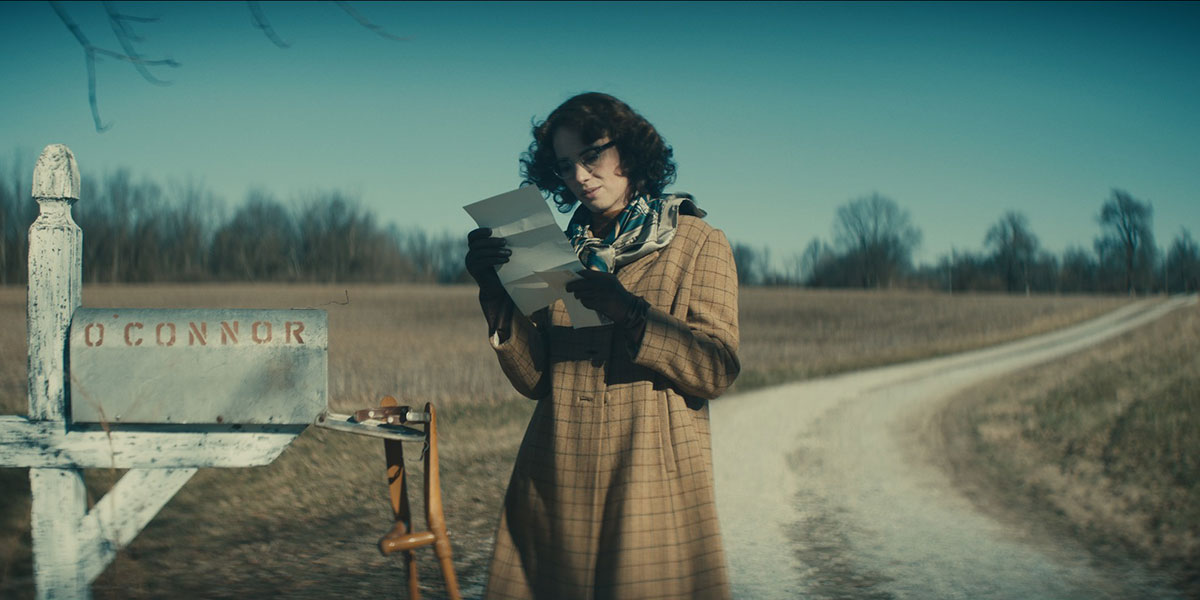
Maya Hawke in Wildcat
Without Air (dir. Katalin Moldovai)
Release date unknown.
Education is in danger. For many places, this is nothing new, and, in other places, it’s gotten worse. But in the US and abroad, we are in the midst of an intense moral panic about what is taught in schools, who is allowed to teach in schools, and what books are allowed in libraries. From The Children’s Hour to this year’s Blue Jean, this sort of moral panic has been explored on-screen many times. And yet, it feels important enough that I’m glad Without Air gives us another example of this story — even if it’s imperfect.
Ana Bauch is the most popular teacher at her high school in Hungary. She teaches literature and also leads the drama group where students bond over performance and poetry. But after recommending a movie about Arthur Rimbaud, one of her student’s fathers complains that she’s spreading homosexuality. Ágnes Krasznahorkai gives a beautiful and subtle performance as Bauch and when the film stays in her perspective, it’s excellent. It’s less successful when it shifts to the student whose father has complained. I feel like that character either needed to be more developed or less — the middle ground feels a bit narratively awkward. Still, the stunning cinematography, lead performance, and important message makes this a worthwhile watch for anyone invested in education.
Your Mother’s Son (dir. Jun Robles Lana)
Release date unknown.
Cinema has always been the primary way I learn about the world. By spending most of my life seeking out stories from places I’ve never visited, I’ve been allowed a window into other people’s histories, cultures, and politics. The more films seen, the more perspectives on a place you can receive, the more context for the next work of art.
If you are not Filipino, are unfamiliar with their political landscape, and haven’t seen other Filipino cinema, Jun Robles Lana’s staggering film Your Mother’s Son still makes its intentions clear. It opens with a caravan throwing political campaign fliers at people the names on their trucks claim to care about. While this film would best be described as an erotic thriller or a family drama, this opening transforms everything that comes after. This is not simply the story of one fucked up group of people — it is a microcosm of a fucked up society.
Throughout the film, this backdrop continues to echo. The center of every scene may be the complicated interpersonal dynamics, but there are frequent mentions of the failing economy, the fascistic police force, the Filipino war on drugs, and the misogynistic hypocrisy of both men and women. This is a film about abuse, and yet it makes the point that our family, our lovers, a teacher, a stranger, are not our only abusers. Sometimes — oftentimes — our abusers are the state and our broken societies.
I’m avoiding plot details, because this is one better to just experience. The acting is incredible — especially from Sue Prado and Kokoy de Santos — and Lana’s style is gripping and unique. This is not a pleasant experience. It is, however, very worth the unpleasantness. The most shocking cinema from all over the world doesn’t aim simply to shock — instead it reveals what’s most shocking about reality and asks us to bear witness.
The Zone of Interest (dir. Jonathan Glazer)
Limited theatrical release on December 8th.
One of my most controversial film opinions is that I don’t like Schindler’s List. While not as atrocious as something like Irena’s Vow, Spielberg’s film still sentimentalizes — and therefore diminishes — the horrors of the Holocaust. With his new film, Jonathan Glazer has done the opposite. He, too, has opted for a non-Jewish protagonist, but rather than sympathetic saviors like Irena Gut Opdyke and Oskar Schindler, Glazer’s film is about SS officer and Auschwitz commandant Rudolf Höss.
Pointedly banal — pointedly boring even — the film observes Höss and his wife Hedwig as they live their happy family life right next door to the concentration camp. Shot like a casual European dramedy about a family at their summer home, the reality that surrounds them is revealed only by the barbed wire fences, small details in conversation, skies filled with smoke, bursts of sound design, and Mica Levi’s increasingly unpleasant score.
Christian Friedel as Höss is frightening in his mundanity and Sandra Hüller as Hedwig gives the film its twisted humanity. The moments where Hedwig is cruel to her house staff almost feel like a relief — evil we can see even if it’s so much milder than what’s over the walls. Glazer injects the film with just enough formal experimentation to refuse an audience any lulls into the Höss perspective. But it’s his commitment to remove that gives the film its ultimate power. Evil is carried out by people — let us never forget that.
I’ve noted release dates for the titles that have them already. I’ll be sure to keep this updated as more of the films get bought and set in the calendar!



There are so, so many films here that I simply have to watch! I’m going to set up alerts so I know when/where they’re available.
Also, “ What Amèlie Does in the Shadows” is an excellent and brutal critique. love it
I enjoyed your reflections on all these, including the not overly queer ones so thank you for writing those up too. Made a list to follow up on many of these as they hopefully receive theatrical or streaming releases!
Thanks for all these reviews, Drew. Your TIFF coverage gets better every year.
I’m disappointed to read that about Rustin, though perhaps I shouldn’t be. I really wanted a compelling telling of Bayard Rustin’s life, worthy of its subject and one that’d propel Colman Domingo into the Oscar conversation.
I had high hopes for Copa 71, especially in light of what’s going on with FIFA and the RFEF, it would’ve been the perfect time for a showcase of what’s possible for women’s soccer without the male-dominated infastructure…but, yeah…it doesn’t sound like what we got.
Also disappointed to read about Wicked Little Letters which I wanted to support because I loved Anjana Vasan so much in Lady Parts. Might have to skip that movie all together though because…yeah…that’d drive me crazy.
I’m definitely adding I Am Sirat to my watch list. His Three Daughters sounds intriguing — just because I’m drawn to portrayals of grief — and that cast sounds incredible.
I wanted Rustin to be great, so I definitely was a bit disappointed. BUT in the scheme of this kind of biopic, it’s not bad. And Colman Domingo really is remarkable. I’ll be curious your thoughts!
I do think Copa 71 is also worth watching even if I was even more frustrated with that one.
Wicked Little Letters… yeah I’d spare yourself that experience. lol